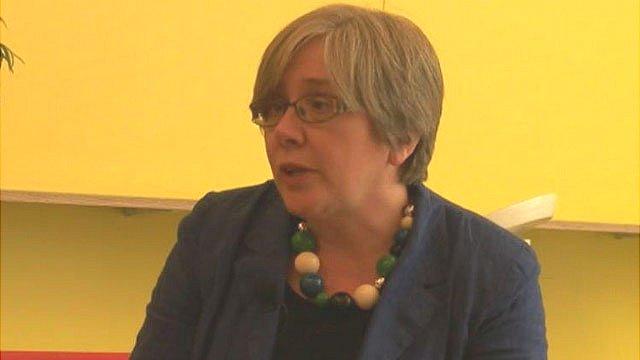Bevan Foundation's bleak vision of 2020 Welsh economy
- Published
Foundation director and report author Dr Victoria Winckler says throwing money at problems is no longer an option.
More unqualified workers chasing low paid, insecure jobs is the bleak vision of Wales in 2020, according to a think-tank.
If forecasts are correct, the gap in productivity between Wales and the UK will widen, analysis from the Bevan Foundation suggests.
It predicts more professional but fewer lower skilled jobs, which make up a significant part of Wales' economy.
But the Wales Office said wages and living standards are both improving.
The foundation urges radical approaches.
Economist Dr Martin Rhisiart said Wales has benefits as a small country but needs to be open to ideas
The Merthyr Tydfil-based think-tank has brought together economic, education, environment and health forecasts.
It gives three scenarios and if the current forecasts are correct, the outlook for Wales in five years is "far from rosy".
The foundation said the Welsh government and public bodies need to re-think how they do things to tackle the challenge to living standards.
The UK government said Wales has the joint fastest growing economy in the UK.
A Welsh government spokesman said: "We will consider the issues raised in this report but let's be clear, we are a pro-business government.
"We work very closely with companies to create growth and jobs in every part of Wales. Inward investment is at its highest for decades because investors know that they can rely on a supportive, agile government and a skilled workforce."
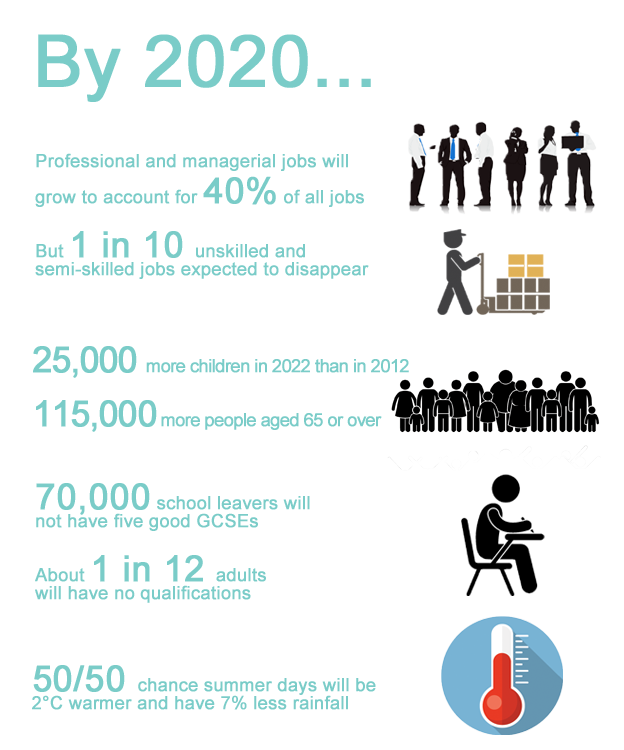
Forecasts in The Shape of Wales To Come
"It is highly unlikely that the approaches of the last 15 years will manage to buck the trend in the next five," said foundation director and report author Dr Victoria Winckler.
"We need to ask some searching and fundamental questions about the role of the state, third sector and business; about how to target scarce resources and how to engage with people.
"These are probably the biggest challenges to face Wales in a generation. They are tough individually but, like buses, they're all coming at once."
The report calls for Wales to make use of its environment, history and culture, businesses and institutions and "crucially, the skills and resilience of its people".

The Shape of Wales To Come
Wales' gross value added (GVA) - the value of wages and profits from goods and services produced - is forecast to lag behind most other UK regions
A minority of the population is at risk of severe poverty
Public sector workers and those on benefits will suffer real-terms falls in income
With an ageing population, there are likely to be more people in poor health
Flood risks and security of water and energy supplies will be of increasing concern
Gaps in Wales' IT and transport infrastructures could remain, despite investment

WHAT WALES COULD LOOK LIKE
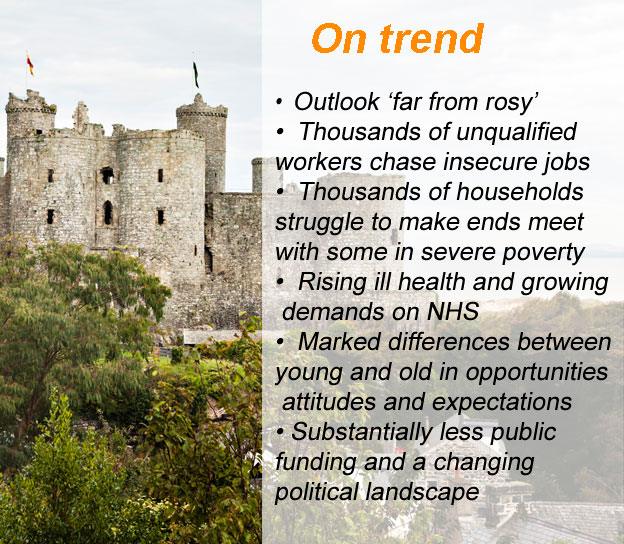
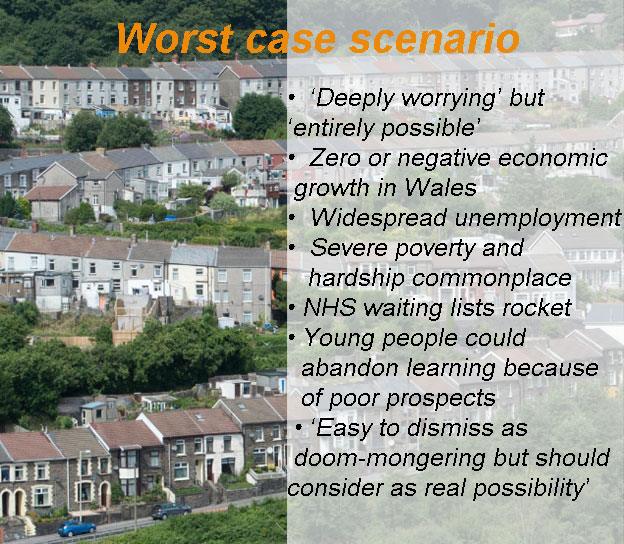
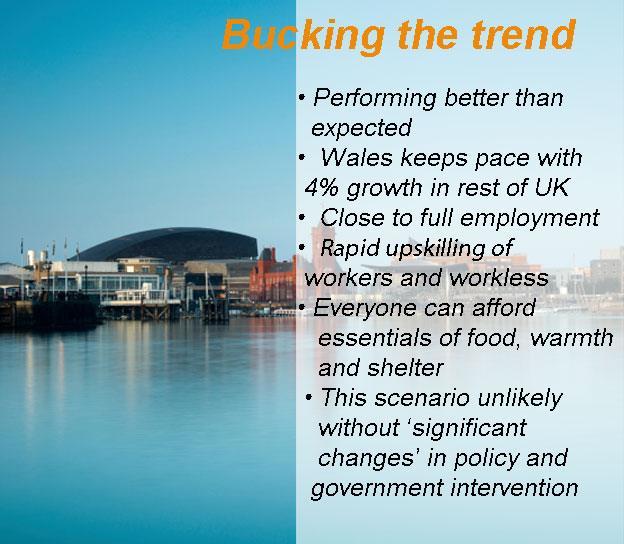

The report said business as usual was not an option and Wales needs to anticipate the future and not just react to the present.
It questions the concept of universal entitlement as public finances tighten - while it would keep free prescriptions for all, it suggests free bus passes for all OAPs could be looked at
People in poverty and with low educational attainment should not all live in designated poorer places, like Communities First areas
Fundamental questions should be asked about the role of the Welsh government and community groups
Harness people's talents across Wales beyond just volunteering
'Ambitious nation'
Dr Martin Rhisiart, an economist at the University of South Wales, said it was an interesting and commendable report but there were many uncertainties with economic forecasts.
He said there was a need for more openness when debating the long-term challenges.
"At times we are lacking some self-critique in Wales. We don't have much independence of thought, the state has a disproportionate role in the lives of individuals, we don't have as big a private sector, so very few independent institutions are doing or are commissioning research around the themes of this report.
"That would lead to diversity and alternative ideas."
The Wales Office said Wales was an ambitious nation with a strong future built on solid economic foundations.
"Notwithstanding the fact that many of the issues touched upon in this report are the responsibility of the Welsh government, it completely ignores the dramatic transformation that the Welsh economy has experienced over the last five years," said a spokesman.
- Published2 July 2015
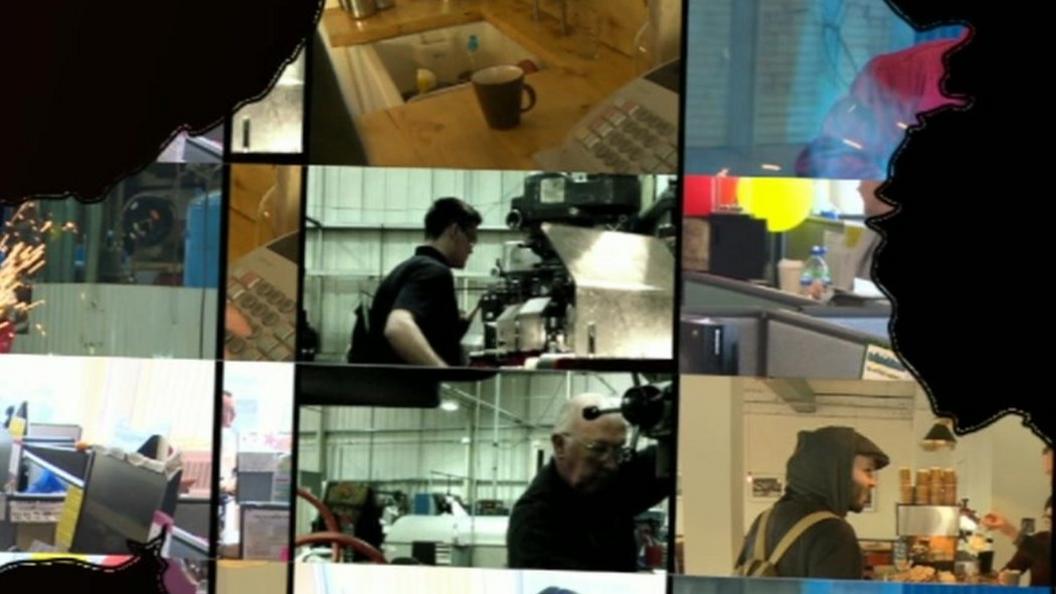
- Published23 July 2015
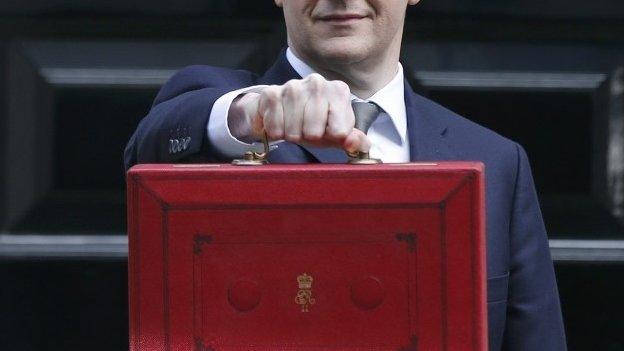
- Published23 July 2015
